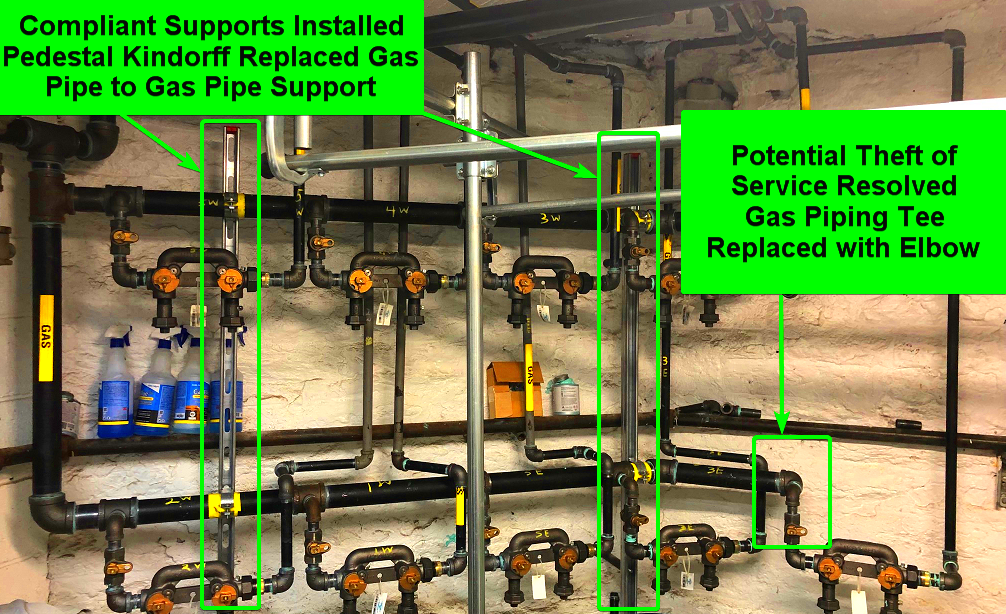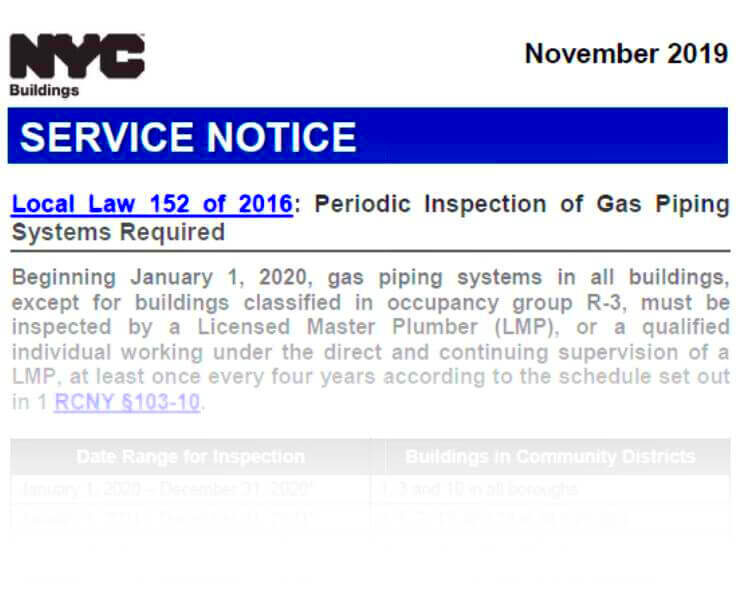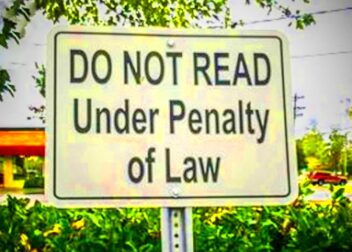Guidelines for Local Law 152 Gas Regulations
Local Law 152 is all about making sure that gas piping systems in buildings are inspected and maintained properly. If you own a home or manage a property it’s important to grasp this law to keep your gas systems safe and up to code. The aim is to avoid accidents and ensure that buildings adhere to safety standards. Speaking from experience I can say that dealing with these regulations may seem overwhelming at first but it’s vital for upholding a secure environment.
Understanding the Purpose of Local Law 152

Local Law 152 was put in place to improve safety regulations for gas piping systems in New York City. The main goal is to reduce the chances of gas leaks and explosions that can have severe consequences. Lets take a moment to examine its key objectives more closely.
- Safety Assurance: The law aims to protect residents from potential hazards associated with gas leaks.
- Preventative Measures: By enforcing regular inspections, the law seeks to identify and address issues before they become serious problems.
- Regulatory Compliance: Ensuring that property owners adhere to safety standards helps maintain overall public safety.
Looking back on the importance of this legislation I recall assisting a friend in dealing with the complexities of these regulations for their building. It became evident that grasping and adhering to Local Law 152 went beyond mere rule following; it was about protecting lives and assets.
Key Requirements for Gas Systems Under Local Law 152
Local Law 152 sets forth guidelines for gas systems to guarantee their proper functioning and safety. The key requirements include
- Periodic Inspections: Gas piping systems must be inspected at least once every four years. This inspection helps identify potential issues such as leaks or corrosion.
- Qualified Inspectors: Inspections must be conducted by a qualified professional who has the necessary certifications and expertise in gas systems.
- Documentation: Property owners are required to keep detailed records of inspections and any maintenance work performed. This documentation should be readily available for review by authorities.
- Prompt Repairs: If any issues are found during an inspection, repairs must be carried out promptly to ensure the safety of the gas system.
Based on my personal encounters with property managers I’ve witnessed the significance of these mandates. Adhering to them not only aids in steering clear of fines but also plays a role in safeguarding the well being of all individuals present in the building.
Inspection and Maintenance Obligations
According to Local Law 152 checking and taking care of gas systems is not merely a matter of following rules. It’s an essential part of keeping people safe. Let me tell you a story about a friend of mine who oversees a property. There was a time when they encountered a situation where a small gas leak that had gone unnoticed for months could have turned into a problem if it weren’t for the regular inspection required by this law.
Here’s the lowdown on these responsibilities:
- Regular Inspections: Gas systems must be inspected every four years. This routine check-up is essential to catch issues early. Inspections should be thorough and conducted by certified professionals.
- Maintenance Records: You must maintain detailed records of all inspections and maintenance activities. These records are vital not only for compliance but also for identifying recurring issues.
- Immediate Repairs: Any issues discovered during inspections must be addressed promptly. Delays in repairs can lead to more significant problems, compromising safety.
- Qualified Personnel: Ensure that inspections and maintenance are carried out by individuals with proper certifications and experience. The expertise of the professional can make a significant difference in the quality of the inspection.
Based on what I have seen the significance of these responsibilities is hard to downplay. Routine checks have prevented people from finding themselves in situations and facing expensive repairs.
Penalties for Non-Compliance with Gas Regulations
Not adhering to Local Law 152 can result in serious repercussions. Through my conversations with landlords and property managers I have witnessed the pressure and financial strain that comes with not following the rules. Let me outline the potential challenges you could encounter.
- Fines: The law imposes monetary fines for failing to conduct inspections or maintain records. These fines can add up, especially if non-compliance is repeated.
- Legal Action: Continued failure to comply can lead to more severe legal actions, including court proceedings. This can be a lengthy and expensive process.
- Increased Risk: Beyond financial penalties, non-compliance increases the risk of gas leaks or other hazards, potentially endangering lives and property.
- Insurance Issues: Non-compliance might also affect your insurance coverage. Some policies may not cover damages resulting from a failure to meet regulatory requirements.
Looking back on what my coworkers have gone through it’s evident that following these rules is way less stressful than facing the consequences of not doing so. It’s definitely smarter to be proactive and make sure everything is in order with your systems.
How to Prepare for a Local Law 152 Inspection
Getting ready for a Local Law 152 inspection might feel overwhelming at first, but if you tackle it with the mindset it can be a breeze. Here are some suggestions drawn from my personal encounters and insights from others who have successfully gone through these inspections.
- Review Documentation: Ensure all records of previous inspections and maintenance are up-to-date and easily accessible. This documentation will be reviewed during the inspection.
- Schedule in Advance: Book your inspection well in advance to avoid any last-minute rush. This also allows you to address any potential issues before the inspection date.
- Conduct a Self-Check: Before the official inspection, perform a thorough check of your gas systems. Look for any visible signs of wear or leaks and address them if possible.
- Communicate with the Inspector: Be open and transparent with the inspector. If there are areas of concern, discuss them openly. A cooperative attitude can help the inspection go smoothly.
- Prepare Your Staff: If you manage a building, ensure that all relevant staff are aware of the inspection and understand their roles in the process.
Based on what I’ve been through I can say that being prepared can really make a difference. I’ve witnessed how having a plan in place can make inspections smoother and less overwhelming. Keep in mind that these inspections are meant to prioritize safety not just enforce rules.
Recent Updates and Changes to Local Law 152
Local Law 152 has been revised multiple times to align with changing safety protocols and advancements in technology. While keeping track of these updates can be tough they play a role in ensuring safety. I recall my neighbor who manages properties facing the task of adapting to the latest changes and it was evident that staying up to date was essential.
Here’s a summary of the recent updates:
- Increased Inspection Frequency: The inspection interval for gas systems has been shortened in some areas, requiring inspections every two years instead of four. This change aims to address emerging safety concerns more promptly.
- Enhanced Reporting Requirements: Property owners are now required to submit more detailed reports about the condition of their gas systems. This includes more comprehensive data on any repairs or issues discovered.
- Stricter Qualifications for Inspectors: The qualifications required for gas system inspectors have been updated. Inspectors must now have additional certifications and training to ensure they’re up-to-date with the latest safety standards.
- Increased Penalties: Penalties for non-compliance have been increased to encourage more rigorous adherence to the regulations. These penalties are designed to motivate property owners to maintain high safety standards.
Based on what I’ve seen these updates show an increasing dedication to safety. Keeping up with these changes goes beyond just following the rules; it’s about making sure we’re doing everything we can to safeguard lives and assets.
Resources and Support for Compliance
Navigating the ins and outs of Local Law 152 can be a bit daunting, but there are numerous resources and support networks at your disposal. Personally, I’ve discovered that seeking assistance and utilizing the tools can greatly ease the journey. Here are some places where you can access support.
- Official City Websites: The New York City Department of Buildings website provides detailed information about Local Law 152, including guidelines, updates, and contact information for further inquiries.
- Professional Associations: Organizations such as the American Gas Association offer resources, training, and certification for gas system inspectors and property managers.
- Consulting Services: Hiring a compliance consultant can provide personalized guidance and ensure that all aspects of Local Law 152 are met. These professionals can offer invaluable assistance, especially when navigating recent changes.
- Online Forums and Communities: Joining online forums and communities dedicated to property management and building safety can offer practical advice and support from others who have dealt with similar issues.
Based on my experiences utilizing these tools can make a difficult job more manageable. Getting the assistance not only ensures adherence to regulations but also enhances overall security and reassurance.
Frequently Asked Questions
Like any rule Local Law 152 raises quite a few questions. I’ve compiled some frequently asked ones along with their responses drawing from my knowledge and the information I have access to.
- What happens if I miss an inspection deadline? If you miss an inspection deadline, you may face fines and other penalties. It’s important to reschedule the inspection as soon as possible and address any issues that may have caused the delay.
- Can I perform the inspection myself? No, inspections must be conducted by a qualified professional who meets the requirements set by Local Law 152. Self-inspections are not accepted.
- How do I find a qualified inspector? You can find qualified inspectors through recommendations from professional associations, or by checking with local regulatory bodies to ensure the inspector is properly certified.
- Are there any exemptions to the law? Certain properties, such as those with limited gas systems or new constructions that have already passed inspections, might have exemptions. It’s best to consult with a compliance expert to understand your specific situation.
- What should I do if I receive a notice of violation? If you receive a notice of violation, address the issues mentioned in the notice as soon as possible. Contact the issuing authority to discuss the next steps and ensure you’re compliant.
Addressing queries and concerns in advance can aid in managing compliance seamlessly. Based on my experience being clear and taking swift action are crucial to preventing issues and ensuring everything operates smoothly.
Conclusion
While dealing with Local Law 152 and its gas regulations may appear challenging at first glance it’s primarily about prioritizing safety and adherence to rules. Based on my experiences and conversations with property managers I’ve found that being well informed and proactive can truly make a difference. By familiarizing yourself with the requirements staying updated on changes and using available resources you can effectively manage your gas systems and steer clear of penalties. The time and effort put into following these regulations is definitely worthwhile not only for staying within the bounds but also for the reassurance that comes from creating a safe environment for everyone involved.


